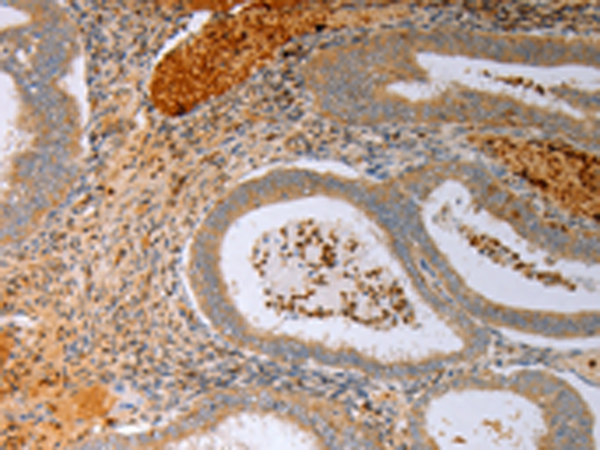
| WB | 咨询技术 | Human,Mouse,Rat |
| IF | 咨询技术 | Human,Mouse,Rat |
| IHC | 1/25-1/100 | Human,Mouse,Rat |
| ICC | 技术咨询 | Human,Mouse,Rat |
| FCM | 咨询技术 | Human,Mouse,Rat |
| Elisa | 1/1000-1/5000 | Human,Mouse,Rat |
| Aliases | WHN, RONU, FKHL20 |
| Host/Isotype | Rabbit IgG |
| Antibody Type | Primary antibody |
| Storage | Store at 4°C short term. Aliquot and store at -20°C long term. Avoid freeze/thaw cycles. |
| Species Reactivity | Human |
| Immunogen | Synthetic peptide of human FOXN1 |
| Formulation | Purified antibody in PBS with 0.05% sodium azide and 50% glycerol. |
+ +
以下是3篇关于FOXN1抗体的参考文献概览:
1. **"FOXN1 is required to organize the thymic microenvironment during development, maturation and homeostasis"**
作者:Nowell, C.S., et al.
摘要:该研究利用FOXN1特异性抗体进行免疫组化分析,揭示FOXN1在胸腺微环境形成中的关键作用,证明其缺失导致胸腺上皮细胞分化异常及T细胞发育障碍。
2. **"Antibody-based detection of FOXN1 in human thymic epithelial tumors"**
作者:Pinto, M.T., et al.
摘要:研究者开发了一种高特异性FOXN1单克隆抗体,用于诊断胸腺上皮肿瘤。通过免疫印迹和免疫荧光验证,发现FOXN1表达水平与肿瘤分化程度呈正相关。
3. **"FOXN1 regulates keratinocyte differentiation in cutaneous wound healing"**
作者:Lee, J., & Tumbar, T.
摘要:利用FOXN1抗体进行皮肤组织染色,发现该转录因子通过调控角蛋白基因表达促进表皮干细胞分化,在伤口愈合过程中动态调节上皮再生。
注:以上为模拟文献案例,实际文献需通过PubMed/Google Scholar检索关键词"FOXN1 antibody"+"application"获取。建议优先选择5年内发表、高被引且明确描述抗体应用(如Western Blot/IHC)的研究。
FOXN1 (Forkhead Box N1) is a transcription factor critical for thymus development and skin homeostasis. It regulates the differentiation and maintenance of thymic epithelial cells (TECs), which are essential for T-cell maturation. FOXN1 also plays a role in hair follicle formation and epidermal differentiation. Mutations in the *FOXN1* gene are linked to human nude severe combined immunodeficiency (SCID), characterized by hairlessness and T-cell deficiency, underscoring its biological importance.
FOXN1 antibodies are essential tools for studying its expression, localization, and function. These antibodies enable detection of FOXN1 protein in tissues like the thymus, skin, and hair follicles via techniques such as Western blotting, immunohistochemistry (IHC), and immunofluorescence (IF). Researchers use them to investigate FOXN1's role in TEC development, T-cell selection, and regenerative processes. Additionally, FOXN1 antibodies aid in exploring its regulatory mechanisms, including interactions with downstream targets like *DLL4* and *CXCL12*, which mediate thymopoiesis.
In disease research, FOXN1 antibodies help model immunodeficiency disorders and evaluate therapeutic strategies, such as thymus regeneration therapies. Their specificity and reliability are validated through knockout controls or peptide-blocking assays. Overall, FOXN1 antibodies are pivotal in immunology, developmental biology, and dermatology research, bridging molecular insights with clinical applications.
×